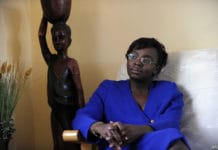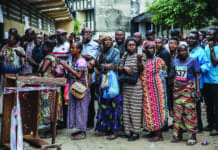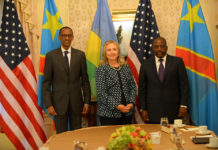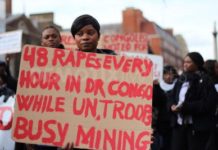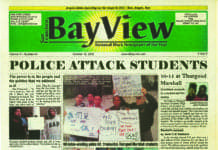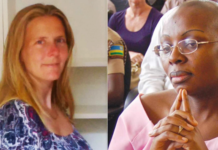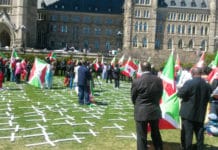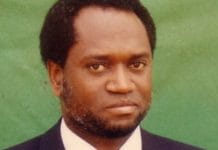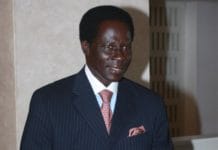Six million lives already lost, majority under age 5
by Claude Gatebuke
In August, members of the M23, a group of rebels backed by the Rwandan military, gang raped a 12 year old girl. In the same month the same rebels stopped an elderly couple, raped the wife and severely beat the husband, who died two weeks later. The above atrocities were documented in a Human Rights Watch Report, an eerie reminder of atrocities committed during the Rwandan Genocide.

What does this have to do with American citizens?
Millions of our tax dollars are sent annually to the governments of Rwanda and Uganda, who are the true perpetrators of these heinous atrocities. A U.N. Group of Experts report confirms that the commander of the M23 rebels is Rwanda’s minister of defense, Gen. James Kabarebe, whose history of butchering Congolese people is well documented.
The report alleges that Gen. Kabarebe, along with Rwanda’s army chief of staff Gen. Charles Kayonga and Gen. Jack Nziza, an advisor to Rwanda’s president Kagame, are providing ammunition, training, logistical support and recruitment of adult and child soldiers under the age of 15 to the M23 rebels. Most are recruited either forcibly or under the false pretext that they are joining the Rwandan military. The report further alleges that Rwanda’s military has directly sent its troops to help the M23 take over towns in eastern Congo, a fact presented to the United States Congress during a recent hearing on Rwanda’s role in the current humanitarian crisis in Congo.
It is one thing for the United States to stand by and watch atrocities unfold as the Clinton administration did during the Rwandan genocide of 1994, which I fortunately survived after losing countless relatives, neighbors and friends and after being made to dig my and my mother’s grave by machete-wielding militias who were ready to kill us. While the U.S. government looked the other way, a million other Rwandans were not fortunate enough to survive, including one of my childhood friends whom I helplessly saw hacked to death with a machete by one of our neighbors. It is another for the United States to remain one of the top two donors giving American taxpayers’ money to governments that are committing these heinous crimes.

A slight improvement in U.S. policy in the region was seen this past summer when the State Department for the first time in 16 years made a public statement expressing concern over Rwanda’s support of the M23 rebels destabilizing the Congo. A group of bipartisan members of Congress sent a letter to Rwanda’s president, Paul Kagame, expressing their “dismay” at Rwanda’s involvement in the violence in Congo. The White House went even further and cancelled military aid to the government of Rwanda in the amount of $200,000. Kagame responded by saying that $200,000 is nothing.
Considering that the U.S. gave Rwanda over $1 billion between 2000 and 2010, Kagame was correct to laugh at the amount the United States withheld; $200,000 out of a regular aid package of approximately $200 million is less than 1 percent. In fact, it is 10 percent of 1 percent. In other words, withholding only $200,000 was a slap on the wrist.
However, since 40 percent of Rwanda’s budget is made up of aid, the United States being a top donor gives it a lot of leverage over Rwanda and a unique opportunity to help end the atrocities without engaging the military option by simply withholding all aid to the Kagame regime until all support for rebels and destabilization of the Congo ceases. It would send a clear message that American people’s money will not be used to sponsor extermination of poor people in foreign countries.
Over the last 16 years, more than 6 million lives have been lost in Congo – and the major perpetrators of those atrocities have been U.S. allies Rwanda and Uganda. The majority of victims have been children under the age of 5. Over the last 16 years, subsequent U.S. administrations have provided aid to the Rwandan and Ugandan regimes. The U.S. remains one of the top two donors of aid to Rwanda today.
Under the command of the Rwandan military leadership, the M23 rebellion is led by Gen. Bosco Ntaganda, a war criminal wanted by the International Criminal Court and known as the “terminator” in Congo. Ntaganda is a former fighter for the current Rwandan regime and is a Rwandan national, according to the ICC indictment of 2006. The culture of impunity has prevailed and allowed war criminals to use Congo as a safe haven to evade justice and enrich themselves. When the time comes for a court to consider evidence of war crimes, crimes against humanity, and possible genocide as documented in the U.N. Mapping Exercise report, crimes sanctioned or committed by Rwandan troops in the Congo will not only become public record but also facts for court cases.
It is therefore in the Kagame regime’s best interest to slow down the process of providing justice for more than 6 million Congolese who have lost their lives since the invasion of Congo in 1996 by Uganda and Rwanda. Glaring evidence of getting in the way of justice is Rwanda’s refusal to hand over another war criminal, Gen. Laurent Nkunda, the former leader of the CNDP – currently renamed M23 – to Congolese courts for trial on his war crimes and crimes against humanity.
The United States being a top donor gives it a lot of leverage over Rwanda and a unique opportunity to help end the atrocities without engaging the military option by simply withholding all aid to the Kagame regime until all support for rebels and destabilization of the Congo ceases. It would send a clear message that American people’s money will not be used to sponsor extermination of poor people in foreign countries.
The U.N. group of experts report points to Gen. Nkunda as a recruiter for the M23. On May 22, Rwandan Foreign Minister Louise Mushikiwabo said that Gen. Laurent Nkunda, who is in Rwanda, “cannot be in prison in Rwanda because he has committed no crime in Rwanda.” Previously, President Kagame of Rwanda told BBC Hard Talk’s Stephen Sackur that “Laurent Nkunda, if you will, is our guest. He has his family to visit him.” This is of course the Gen. Nkunda who committed massacres of scores of families, displaced at least 300,000 people from their homes and broke countless families apart between 2006 and 2008.
Today, President Obama has an opportunity to put his money where his mouth is. He recently put in place a mass atrocities prevention board to combat exactly what is happening in Congo today. In fact, Stephen Rapp, who leads the U.S. Office of Global Criminal Justice, warned Rwandan officials, including Paul Kagame, that they may be charged with war crimes for atrocities committed in Congo. However, most U.S. action can be described as a slap on the wrist and looking the other way.
The current crisis in the Congo calls for swift and decisive action. It is a true test as to whether the administration is really committed to ending mass atrocities. It is in the interest of the American people to use our tax dollars wisely. Our tax dollars should never be spent on governments that are committing war crimes, crimes against humanity and possible genocide.
As a U.S. citizen who survived genocide in Rwanda, I find it unacceptable to give more resources to alleged war criminals. When given more resources, war criminals commit more crimes. It is also wrong to turn a blind eye to such atrocities.
The current crisis in the Congo calls for swift and decisive action. It is a true test as to whether the administration is really committed to ending mass atrocities.
The best way for the U.S. to honor millions of victims of senseless violence perpetrated by our allies in the African Great Lakes Region and to hold accountable the Rwandan government and its proxies who are currently supporting a rebellion in Congo’s North Kivu province is to withhold aid. Withholding aid from the Rwandan government and enforcing a law President Obama sponsored and won passage of while he was a senator, PL109-456, would be a great start. This requires each of us to pick up the phone and call our Congress members, representatives and senators, to use the withholding of aid as a tool to help end the atrocities that include the use of child soldiers, rape and summary executions by the Rwanda-backed M23 so-called rebels.
The best way for the U.S. to honor millions of victims of senseless violence perpetrated by our allies in the African Great Lakes Region and to hold accountable the Rwandan government and its proxies who are currently supporting a rebellion in Congo’s North Kivu province is to withhold aid.
It is high time to give aggressive diplomacy and economic sanctions a chance to take part in resolving the crisis and ending the violence in the Congo. According to the Obama administration, “Preventing mass atrocities and genocide is a core national security interest and a core moral responsibility of the United States.” So is spending our tax dollars on responsible and non-criminal governments.
Claude Gatebuke is a U.S. based human rights activist who survived the Rwandan genocide in 1994. He appears regularly on national and international radio and television stations and often speaks at schools and community organizations. He has been a guest at the White House and has testified before both houses of the U.S. Congress. He is the executive director of the African Great Lakes Action Network, AGLAN, and can be reached at Claude@aglan.org.

 Store
Store



